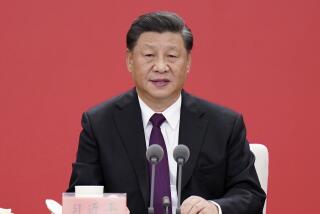Re-branding Beijing
- Share via
DENG XIAOPING, arguably the most important world leader of the past half-century, famously said “to get rich is glorious.” It may not be as stirring as “workers of the world, unite” in the communist lexicon of slogans, but it proved equally galvanizing.
Today, however, it is another no-nonsense saying of the former Chinese leader that underscores the dilemma facing his successors in Beijing: “It doesn’t matter if a cat is black or white,” said Deng, “so long as it catches mice.”
That’s not quite true, it turns out, as evidenced by the current anti-China backlash in this country that forced CNOOC, the partly state-owned Chinese oil company, to withdraw its offer to buy El Segundo-based Unocal. Beijing wanted to be treated as just another foreign investor but had to retreat because of what CNOOC has called a political environment that is both “regrettable and unjustified.”
On the merits, CNOOC may be right, but China has to realize it isn’t helping itself by self-identifying as a communist nation. It may be one thing internally for its leaders to mobilize the Chinese Communist Party to execute a market-oriented counterrevolution, of all things, but it creates confusion overseas, in the global marketplace, where consumers care and want to know whether the cat is black or white -- or red, to be more precise.
China increasingly faces a huge branding problem as it takes its place in the world economy. The nation’s private sector accounts for more than half its economic output; the value of its currency is now allowed to float in reaction to market forces; foreign investment is welcome, and last year China amended its constitution to read: “Legal private property is not to be encroached upon.”
The game is up, in other words. A Communist Party embracing private property makes about as much sense as the Catholic Church renouncing the resurrection, but there you have it. Certainly the party’s founders in 1921 -- and their followers who endured the Japanese occupation, the Long March and the Cultural Revolution -- couldn’t have envisioned this as the endgame. A Starbucks in every hamlet?
China remains nominally communist mostly for political, not economic, reasons. For a party intent on monopolizing power, Marxism provides a more grandiose justification than that available to the run-of-the-mill military dictatorship. But any dictatorship with blood on its hands will find it difficult to present itself as an attractive brand.
And there is no question that when someone such as former CIA Director James Woolsey rails against CNOOC as “the corporate vehicle of a communist dictatorship” -- to pick a representative inside-the-Beltway statement -- his words are meant to conjure up images of the Tiananmen Square massacre and the Cultural Revolution.
The Chinese Communist Party needs to pull a Philip Morris. A few years ago, the giant tobacco company decided its image had suffered enough and renamed itself Altria. It’s not quite as clean a solution as embracing democracy (or getting out of the cigarette business), but it would be a step toward projecting a more benign image and acknowledging the reality that as an economic matter, Marxism is kaput.
Another reason for the party to re-brand itself is that communism is about as drab and un-hip as a Mao suit. A case in point: The crucial 1978 session that launched Deng’s “socialist modernization” was known as the “Third Plenary Session of the 11th Central Committee of the Communist Party.” Pass the remote. Even do-gooders know branding is important -- hence the recent move by the venerable Lawyers Committee for Human Rights to change its name to a much-catchier “Human Rights First.”
The 70-million-member Communist Party could toy with keeping its English “CCP” initials and go with something such as the “Chinese Cuddly Panda.” It’s hard not to smile when you think of pandas, which are also associated with China, and when you are the most populous nation on Earth, and your economy is growing 10% a year, and people are scared to death of being steamrolled by you, you should give them something to smile about.
Or the party could make a clever play on the country’s name in Chinese -- literally, the “Middle Kingdom” -- and rename itself something catchy like Centria, which sounds reassuringly, well, centrist.
More to Read
Sign up for Essential California
The most important California stories and recommendations in your inbox every morning.
You may occasionally receive promotional content from the Los Angeles Times.













